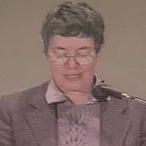Copyright Legislation Introduced
On March 14 Representative Robert Kastenmeier (D-WI) introduced H.R. 4263, a bill to amend the copyright law to clarify that the principle of fair use established for published copyrighted works also applies to unpublished copyrighted materials. “This issue arises,” Kastenmeier explained, “because of a series of cases decided by the U.S. Supreme Court and the U.S. Court of Appeals for the Second Circuit.” Considerable confusion concerning the legality of quoting limited amounts of unpublished letters and diaries has resulted from the Supreme Court’s recent decision not to review the case of New Era Publications v. Henry Holt. This case involved the use of unpublished letters and diaries in a critical biography of the founder of the Church of Scientology, L. Ron Hubbard who died in 1986. The decision of the the second U.S. Circuit Court of Appeals in New York stated that unpublished primary source materials “normally enjoy complete protection” from any fair use quotations and that the “copying of ‘more than minimal amounts’ of unpublished expressive materials calls for an injunction” forbidding publication. “Whether or not the laws have been correctly interpreted,” Kastenmeier noted “the chilling effect of the New Era decision is obvious and it is real.” In introducing a brief bill which would insert in the copyright law “whether published or unpublished,” after “fair use of copyrighted work,” Kastenmeier has placed the issue before the Congress and plans to hold hearings soon.
Senator Paul Simon (D-IL) introduced a parallel bill, S.2370, in the Senate on March 29. “The issue in a nutshell,” Simon explained, is “how do we balance the interest of accurate scholarship or journalism against the right of authors to control the publication of their own unpublished work?” Simon sees this essential balance being lost as “some federal courts have adopted a rule that would tip the scales against critical historical analysis.”
National Archives FY’91 Appropriation Hearing
On April 2, John Fleckner, president of the Society of American Archivists, testified on behalf of the National Coordinating Committee before the House Subcommittee on Treasury, Postal Service, and General Government regarding the l991 budget for the National Historical Publications and Records Commission and the National Archives. Fleckner observed that while many Eastern Europeans have taken great risks to have access to their historical records that Americans take their history for granted. “The day-to-day threat to our historical record,” he asserted “is not tyranny but neglect.” Fleckner enumerated the effects a decade of frugal budgets have had on the National Archives. Today the National Archives is left “with approximately the same number of employees it had fifteen years ago; with more than one-third of its records inadequately accounted for; with vast backlogs of older records in agencies lacking proper evaluation for potential historical content; with growing quantities of electronic records requiring specialized equipment and technical staff; with sharply reduced capacity to provide reference services despite escalating public demand; and with insufficient funds for the grants program of the National Historical Publications and Records Commission.” To begin to meet some of these essential needs, Fleckner urged an FY’91 appropriation for the National Archives of $150 million which would include $8 million for the National Historical Publications and Records Commission’s grants program. The $150 million amount is an increase of $22 million over the Administration’s request.
National Park Service Urged to Review Its Thematic Framework of American History
During the Organization of American Historians meeting in Washington in April, the NCC and the National Parks and Conservation Association convened a group of American historians to discuss with leaders of the National Park Service the thematic framework, a comprehensive outline of American history. National Park Service staff use the thematic framework in making judgments about the designations of new National Parks and National Historic Landmarks and in preparing and implementing general management plans for park unites. It has been some years since the National Park Service last undertook a major reevaluation of the thematic framework. Participants at the April meeting noted the variety of ways in which the current framework does not adequately reflect the breadth of contemporary historical scholarship. They pointed out that the current framework relies too heavily on political, military, and architectural history and fails to highlight many other aspects of the American experience. A consensus emerged at the conclusion of the meeting. The group recommended that the National Park Service convene a symposia which would include leading scholars of American history to undertake a thorough reexamination and revision of the thematic framework. Both the Organization of American Historians Executive Board and the Professional Division of the American Historical Association has passed resolutions calling for a revision of the National Park Services’ thematic framework and seeking the necessary funding for such an endeavor.

